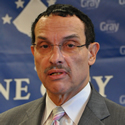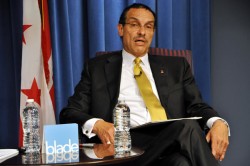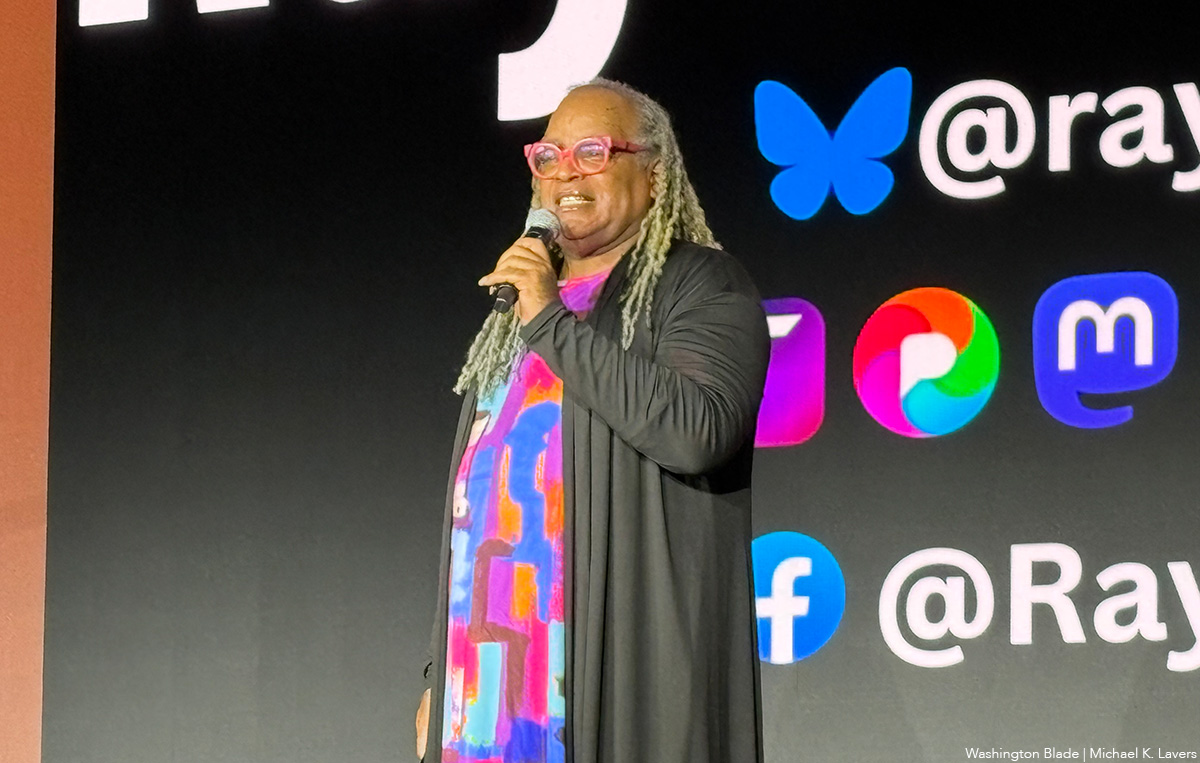Local
Gray board appointee called gays ‘faggots’
Local activists divided over decision to name Leroy Thorpe to post


Mayor Vincent Gray’s decision to appoint a controversial civic leader to a mayoral advisory committee has rankled some. (Blade file photo by Michael Key)
Gay activists had mixed views this week over a decision by Mayor Vincent Gray to appoint a controversial civic leader who in past years referred to gays as “faggots” to a mayoral advisory committee that looks at city programs to curtail juvenile delinquency.
Gray last week named Leroy Thorpe, a licensed social worker and counselor with the D.C. Department of Youth Rehabilitation Services and a longtime civic activist in the city’s Shaw neighborhood, to the mayor’s Juvenile Justice Advisory Group. The unpaid advisory panel assists the mayor and DYRS, among other things, on how to use federal funds to strengthen the city’s juvenile justice system.
D.C. Council member Jack Evans (D-Ward 2), a longtime supporter of LGBT rights, sent Gray a letter strongly recommending Thorpe for the appointment.
Evans could not be immediately reached for comment.
And Ron Collins, Gray’s gay director of the Mayor’s Office of Boards and Commissions, said he vetted Thorpe for the appointment and recommended that the mayor name him to the advisory panel. Collins said Thorpe’s background and experience on juvenile justice issues showed him to be qualified for the post.
“I’ve known Leroy Thorpe for a number of years and I really don’t feel that he is a bigot toward any community,” Collins told the Blade.
Thorpe told the Blade in a phone message on Monday that he prefers not to discuss things he said in the past but said he’s changed his views and treats all people with respect.
“These days, you know, I got older, got wiser,” he said. “And I don’t act like I did before, back in the time when…I spoke without thinking. Everybody deserves respect and I don’t care who or what you are.”
Martin Moulton, president of the Convention Center Community Association, a Shaw-based group that has long been at odds with Thorpe, says Thorpe’s “history of bigotry” makes him unsuitable for a mayoral appointment.
In a series of e-mails sent to public officials and gay activists, Moulton points to statements Thorpe has made about gays on at least two occasions over the past 20 years. One took place in 1991, when Thorpe shouted through a bullhorn at a polling station on Election Day that gay City Council candidate Jim Zais was a “faggot” and Shaw voters should not support him.
Zais, who died of AIDS in 1994, lost the election to Evans by a close margin. At the time, Evans and his supporters disavowed Thorpe’s characterization of Zais, saying he wasn’t representing Evans or the Evans campaign.
Moulton noted that Thorpe several years ago called gay D.C. Council member David Catania (I-At-Large) an anti-gay name during a City Council hearing.
According to Moulton, Gray violated a promise he made to the Gay and Lesbian Activists Alliance on a GLAA questionnaire during last year’s mayoral election campaign, when Gray said he would “decline to honor individuals or organizations that promote any sort of bigotry.”
William Waybourn, former publisher of the Washington Blade and a Shaw resident, said Thorpe called him a faggot during a Shaw Advisory Neighborhood Commission meeting in 2007 after Waybourn spoke at the meeting on an issue unrelated to LGBT rights.
“I don’t know why he did it,” said Waybourn.
Waybourn said Thorpe was less hostile toward him a short time later when the two attended a hearing by the city’s Alcoholic Beverage Control Board. Thorpe testified at the hearing against an application for a liquor license by owners of BeBar, a gay bar seeking to open on 9th Street in the Shaw neighborhood. Thorpe joined members of Shiloh Baptist Church, located across the street from the bar, who opposed the bar on grounds that it was not appropriate for it to be that close to a church.
The ABC Board later approved the license.
Shaw Advisory Neighborhood Commissioner Alex Padro, who has had dealings with Thorpe when Thorpe served on the ANC, called Thorpe’s appointment to a city board an “outrage.”
“The suggestion that someone with his record has changed doesn’t ring true,” he said.
Veteran D.C. gay activist and Ward 8 community leader Phil Pannell and Christopher Dyer, director of the city’s Office of GLBT Affairs under former Mayor Adrian Fenty, each said they have cordial relations with Thorpe and don’t consider him to be anti-gay.
“He might have been a homophobe in the past but I have observed a change,” Dyer said. “I don’t think deep down inside his soul he is homophobic.”
Pannell said Thorpe on several occasions has attended Pannell’s birthday celebration at a Ward 8 restaurant, which Pannell often uses as a fundraiser for community organizations or charitable causes.
“He has always been very respectful to me,” said Pannell. “He came to one of my functions with his wife. I would be hard pressed to call someone a homophobe who comes to my birthday,” said Pannell, who notes that his sexual orientation is widely known in political circles throughout the city.
Pannell said that while Thorpe clearly has used poor judgment in some of his references to gays in the past, he said he was moved when Thorpe showed up at Jim Zais’ memorial service in 1994 and apologized for the Election Day incident in which he called Zais an anti-gay name.
GLAA Vice President Rick Rosendall said he is troubled over Thorpe’s past remarks using the word “faggot” and believes Thorpe’s appointment could represent a contradiction to Gray’s response to the GLAA candidate questionnaire. But Rosendall said he also believes in “redemption” by people who change their views and attitudes on LGBT people.
“If he truly has changed, that’s something we would welcome,” he said.
Virginia
McPike wins special election for Va. House of Delegates
Gay Alexandria City Council member becomes 8th LGBTQ member of legislature

Gay Alexandria City Council member Kirk McPike emerged as the decisive winner in a Feb. 10 special election for a seat in the Virginia House of Delegates representing Alexandria.
McPike, a Democrat, received 81.5 percent of the vote in his race against Republican Mason Butler, according to the local publication ALX Now.
He first won election to the Alexandria Council in 2021. He will be filling the House of Delegates seat being vacated by Del. Elizabeth Bennett-Parker (D-Alexandria), who won in another Feb. 10 special election for the Virginia State Senate seat being vacated by gay Sen. Adam Ebbin (D-Alexandria).
Ebbin is resigning from his Senate next week to take a position with Virginia Gov. Abigail Spanberger’s administration.
Upon taking his 5th District seat in the House of Delegate, McPike will become the eighth out LGBTQ member of the Virginia General Assembly. Among those he will be joining is Sen. Danica Roem (D-Manassas), who became the Virginia Legislature’s first transgender member when she won election to the House of Delegates in 2017 before being elected to the Senate in 2023.
“I look forward to continuing to work to address our housing crisis, the challenge of climate change, and the damaging impacts of the Trump administration on the immigrant families, LGBTQ+ Virginians, and federal employees who call Alexandria home,” McPike said in a statement after winning the Democratic nomination for the seat in a special primary held on Jan. 20.
McPike, a longtime LGBTQ rights advocate, has served for the past 13 years as chief of staff for gay U.S. Rep. Mark Takano (D-Calif.) and has remained in that position during his tenure on the Alexandria Council. He said he will resign from that position before taking office in the House of Delegates.
Local
Local LGBTQ groups, activists to commemorate Black History Month
Rayceen Pendarvis to moderate Dupont Underground panel on Sunday

LGBTQ groups in D.C. and elsewhere plan to use Black History Month as an opportunity to commemorate and celebrate Black lives and experiences.
Team Rayceen Productions has no specific events planned, but co-founder Rayceen Pendarvis will attend many functions around D.C. this month.
Pendarvis, a longtime voice in the LGBTQ community in D.C. moderated a panel at Dupont Underground on Feb. 8. The event, “Every (Body) Wants to Be a Showgirl,” will feature art from Black burlesque artists from around the country. Pendarvis on Feb. 23 will attend the showing of multimedia play at the Lincoln Theatre that commemorates the life of James Baldwin.
Equality Virginia plans to prioritize Black voices through a weekly online series, and community-based story telling. The online digital series will center Black LGBTQ voices, specifically trailblazers and activists, and contemporary Black queer and transgender people.
Narissa Rahaman, Equality Virginia’s executive director, stressed the importance of the Black queer community to the overall Pride movement, and said “Equality Virginia is proud to center those voices in our work this month and beyond.”
The Capital Pride Alliance, which hosts Pride events in D.C., has an alliance with the Center for Black Equity, which brings Black Pride to D.C. over Memorial Day weekend. The National LGBTQ Task Force has no specific Black History Month events planned, but plans to participate in online collaborations.
Cathy Renna, the Task Force’s director of communications, told the Washington Blade the organization remains committed to uplifting Black voices. “Our priority is keeping this at the forefront everyday,” she said.
The D.C. LGBTQ+ Community Center is also hosting a series of Black History Month events.
The D.C. Public Library earlier this year launched “Freedom and Resistance,” an exhibition that celebrates Black History Month and Martin Luther King Jr. It will remain on display until the middle of March at the Martin Luther King Jr. Memorial Library at 901 G St., N.W.
District of Columbia
U.S. Attorney’s Office drops hate crime charge in anti-gay assault
Case remains under investigation and ‘further charges’ could come

D.C. police announced on Feb. 9 that they had arrested two days earlier on Feb. 7 a Germantown, Md., man on a charge of simple assault with a hate crime designation after the man allegedly assaulted a gay man at 14th and Q Streets, N.W., while using “homophobic slurs.”
But D.C. Superior Court records show that prosecutors with the Office of the U.S. Attorney for D.C., which prosecutes D.C. violent crime cases, charged the arrested man only with simple assault without a hate crime designation.
In response to a request by the Washington Blade for the reason why the hate crime designation was dropped, a spokesperson for the U.S. Attorney’s office provided this response: “We continue to investigate this matter and make no mistake: should the evidence call for further charges, we will not hesitate to charge them.”
In a statement announcing the arrest in this case, D.C. police stated, “On Saturday, February 7, 2026, at approximately 7:45 p.m. the victim and suspect were in the 1500 block of 14th Street, Northwest. The suspect requested a ‘high five’ from the victim. The victim declined and continued walking,” the statement says.
“The suspect assaulted the victim and used homophobic slurs,” the police statement continues. “The suspect was apprehended by responding officers.”
It adds that 26-year-old Dean Edmundson of Germantown, Md. “was arrested and charged with Simple Assault (Hate/Bias).” The statement also adds, “A designation as a hate crime by MPD does not mean that prosecutors will prosecute it as a hate crime.”
Under D.C.’s Bias Related Crime Act of 1989, penalties for crimes motivated by prejudice against individuals based on race, religion, sexual orientation, gender identity, disability, and homelessness can be enhanced by a court upon conviction by one and a half times greater than the penalty of the underlying crime.
Prosecutors in the past both in D.C. and other states have said they sometimes decide not to include a hate crime designation in assault cases if they don’t think the evidence is sufficient to obtain a conviction by a jury. In some instances, prosecutors have said they were concerned that a skeptical jury might decide to find a defendant not guilty of the underlying assault charge if they did not believe a motive of hate was involved.
A more detailed arrest affidavit filed by D.C. police in Superior Court appears to support the charge of a hate crime designation.
“The victim stated that they refused to High-Five Defendant Edmondson, which, upon that happening, Defendant Edmondson started walking behind both the victim and witness, calling the victim, “bald, ugly, and gay,” the arrest affidavit states.
“The victim stated that upon being called that, Defendant Edmundson pushed the victim with both hands, shoving them, causing the victim to feel the force of the push,” the affidavit continues. “The victim stated that they felt offended and that they were also gay,” it says.
-

 Virginia4 days ago
Virginia4 days agoMcPike wins special election for Va. House of Delegates
-

 New York5 days ago
New York5 days agoN.Y. lawmaker vows ‘Pride flag will fly again’ at Stonewall Monument
-

 a&e features5 days ago
a&e features5 days agoMeet D.C.’s Most Eligible Queer Singles
-

 District of Columbia5 days ago
District of Columbia5 days agoU.S. Attorney’s Office drops hate crime charge in anti-gay assault


















